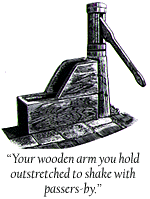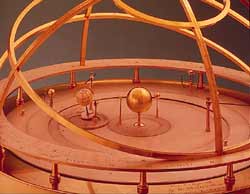Main Menu · Search · Current Issue · Contact · Archives · Centennial · Letters to the Editor · FAQs


The hapless editors of Harvard Magazine put together a feature article consisting of excerpts from admissions essays by members of the incoming College class and published it in the September-October 1996 issue with the title "'00: Admissions Essays From the Millenial Class." To show that the title was as intended, and not some mischief by the pixies of typography, the editors put "millenial" on the contents page as well. Damn and blast. "Millennial" and "millennium" (although not "millenary," which has a different root) are meant to have two n's.
During the ensuing period of mortification, the editors gathered evidence of, and delighted in, the failures of others. Examples included a flyer from the publisher Rizzoli heralding a forthcoming fashion guide, Millenium Mode. And an editor found in a trash bin a one-ounce sample jar of "Millenium Light Renewal Creme" from Elizabeth Arden.
 The orrery on the cover. Photograph courtesy of the Collection of Historical Scientific Instruments |
By today's late date everyone has seen "millennium" a million times, yet the misspellings continue. Professor Stephen R. Graubard, Ph.D. '52, editor of Daedalus, the journal of the American Academy of Arts and Sciences, declares in an essay just published therein that "the new century and the new millenium beckon....If Daedalus was founded 'to give the intellectual community a voice of its own,' it is perfectly legitimate to ask where that 'intellectual community' is today, on the eve of the millenium." The new Courses of Instruction, 1999-2000 of the Faculty of Arts and Sciences has a photograph of an eighteenth-century orrery on its cover, and in a note inside one reads that it "served an important role in early science education at Harvard. Its history, combined with its significance in explaining some of the fundamental principles of our calendar, made it a natural choice for the millenium cover of this book." In September in the New York Times, a full-page advertisement by Procter & Gamble introducing Dryel trumpets, "In the next millenium, people will care for their 'dry clean only' clothes right at home. Hey, isn't that coming up?" Procter & Gamble and the editor and copyeditor of this magazine all hail from Cincinnati, and it may be that no one there knows how to spell "millennium" despite the two terminal n's they're used to.
![]()
Scrupulous millenarians are vexed by the question of when to celebrate. The Harvard Faculty Club has no doubts, however. It plans a "Millennium Celebration" this New Year's Eve with food, drink, and dancing for $99 per person. Nor has Harvard's Museum of Natural History, which is mounting a "Millennium Expedition" from December 27, 1999, to January 19. "Be among the first people on earth" to greet the twenty-first century, a brochure urges, "with traditional Polynesian feasting and festivities on the distant island of Tongatapu," one of many exotic stopovers as travelers circle the globe in a private jet for $44,950 per person, with single accommodations where available for an additional $5,990. Others will be shocked by this untimely revelry.
"When do centuries end?" asks Stephen Jay Gould, Agassiz professor of zoology and professor of geology, in Questioning the Millennium. "At the termination of years marked '99 (as common sensibility suggests), or at the close of years marked '00 (as the narrow logic of a particular system dictates)?" Our present system of measuring time, Gould explains, was devised by a sixth-century monk, Dionysius Exiguus, or Dennis the Short, who started the trouble by numbering the first year 1, rather than 0. "If we insist that all decades must have ten years," writes Gould, "and all centuries one hundred years, then year 10 belongs to the first decade--and, sad to say, year 100 must remain in the first century." Owen Gingerich, professor of astronomy and the history of science, concurs with this conclusion, but argues, in the journal Planetary Report, that "the presence or absence of a year 0 has nothing to do with it." Dennis assumed that Jesus was born on Christmas and started counting the new era with the next year, the first full year of Christ's life, as was customary when measuring the reigns of emperors.
"The logic of Dionysius's arbitrary system," Gould writes, "dictates one result," favored by the intelligentsia over the centuries and heretofore prevailing. "Common sensibility leads us to the opposite conclusion [the perpetual position of popular culture]: We want to match transitions with the extent or intensity of apparent sensual change, and 1999 to 2000 just looks more definitive than 2000 to 2001." Gingerich calls this "the odometer syndrome." The debate cannot be resolved, Gould thinks, since both logic and sensibility make legitimate claims. Writes Gingerich, "My bottom line is: why not celebrate twice?"
~Primus V